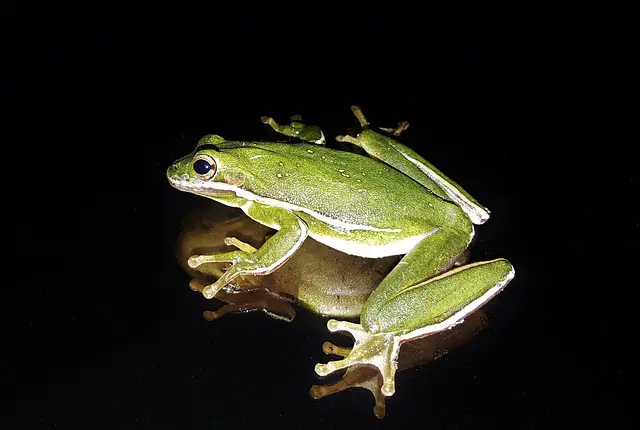While green tree frogs are not typically considered a food source for humans, some people may wonder whether it is safe to eat them.
According to experts, green tree frogs are not considered a safe food source for humans.
While not toxic, they may carry harmful bacteria or parasites that can cause illness if ingested.
Additionally, green tree frogs are not typically raised for food, so there are no regulations to ensure their safety for human consumption.
As a result, eating green tree frogs is generally not recommended.
Human Consumption of Frogs
Frogs have been consumed by humans for centuries and are considered a delicacy in some cultures. Frog legs are a popular dish in many countries, including France, China, and Thailand. However, it is important to note that not all species of frogs are safe for human consumption.
Green tree frogs, for example, are not recommended for human consumption. This is because they secrete a toxic substance called bufotoxin, which can cause harm to humans if ingested. Bufotoxin can cause a range of symptoms, including nausea, vomiting, and even heart failure.
While some people may argue that the toxin can be removed by cooking the frog, it is not a risk worth taking. It is best to avoid consuming green tree frogs altogether and opt for other safe species for human consumption.
In addition to the potential health risks, it is also important to consider the impact of consuming frogs on the environment. Many frog populations are already threatened by habitat loss and pollution, and overconsumption can further contribute to their decline.
Overall, while some species of frogs are safe for human consumption, it is important to do thorough research and exercise caution before consuming them. Green tree frogs, in particular, should be avoided due to their toxicity.
Potential Health Risks
While green tree frogs are not toxic, consuming them can pose health risks. These include:
1. Allergic Reactions
Some individuals may be allergic to green tree frogs or other amphibians. Symptoms of an allergic reaction can include skin rash, hives, difficulty breathing, or swelling of the face or throat. If you experience these symptoms after consuming a green tree frog, seek medical attention immediately.
2. Parasites
Green tree frogs can carry a variety of parasites, including tapeworms and nematodes. Consuming a frog infected with parasites can lead to health problems such as diarrhea, abdominal pain, and vomiting.
3. Bacterial Infections
Frogs can carry bacteria such as Salmonella and Campylobacter, which can cause food poisoning. Symptoms of food poisoning can include fever, nausea, vomiting, and diarrhea.
It is important to note that cooking the frog thoroughly can help reduce the risk of these potential health hazards. However, avoiding consuming green tree frogs is still recommended to prevent any potential health risks.
Cultural and Ethical Considerations
When consuming green tree frogs, cultural and ethical considerations must be considered. In some cultures, eating frogs is a common practice and is considered a delicacy. For example, in Vietnam, frog meat is a popular ingredient in many dishes, including soup and stir-fry.
However, eating frogs in other cultures is considered taboo or unethical. In some Western countries, frogs are seen as cute and beloved creatures that should be protected rather than consumed.
Additionally, some people may have ethical concerns about treating frogs before they are consumed, such as whether they are raised in humane conditions or sustainably caught in the wild.
It is important to note that consuming green tree frogs can also have environmental implications. These frogs play an important role in their ecosystem, and their removal for consumption could potentially disrupt the balance of the ecosystem.
Cultural and ethical considerations should be considered before consuming green tree frogs. It is essential to weigh the potential environmental impact and ethical concerns against cultural traditions and personal preferences.
Alternatives to Eating Green Tree Frogs
While some cultures may consider green tree frogs a delicacy, it is essential to note that many alternative sources of protein and nutrition are available. Here are a few options to consider:
- Poultry: Chicken, turkey, and duck are all excellent sources of protein and can be prepared in various ways. They are also readily available at most grocery stores and markets.
- Fish: Fish is a great source of protein and omega-3 fatty acids. There are many different types of fish to choose from, including salmon, tuna, and trout.
- Beans and legumes: Beans and legumes are an excellent source of protein and fiber. They can be used in a variety of dishes, such as soups, stews, and salads.
- Nuts and seeds: Nuts and seeds are a good source of protein, healthy fats, and other nutrients. They can be eaten as a snack or used in recipes.
It is important to remember that there are many different options when it comes to choosing a healthy and sustainable diet. While green tree frogs may be a traditional food in some cultures, it is important to consider the impact that consuming these animals may have on local ecosystems. By choosing alternative sources of protein, individuals can help to protect the environment and ensure a sustainable future.
Conclusion
In conclusion, while green tree frogs are not toxic, they are not recommended for human consumption. The primary reason is that they are a protected species in many areas and it is illegal to hunt or eat them. Additionally, even if it were legal, there are potential health risks associated with consuming wild-caught frogs.
Green tree frogs may carry parasites and bacteria that can cause illness in humans. Cooking the frog thoroughly can help reduce the risk of illness, but it is still not recommended. Furthermore, green tree frogs are not a significant source of nutrition and are not a sustainable food source.
Overall, it is best to appreciate green tree frogs for their beauty and important role in the ecosystem rather than considering them as a food source.




